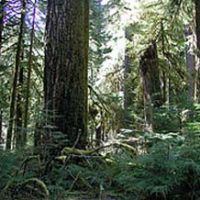An argument made by proponents of logging after wildfire (also called “post-fire logging”) is that it captures the economic value of the fire-affected trees.
Unfortunately, it almost always costs more to harvest trees affected by wildfire than the sale of the timber generates for needed watershed restoration work such as stabilizing slopes, replanting, and removing brush and downfall from the landscape. Consequently, the federal Treasury and counties receive little, if any, receipts from post-fire logging.

